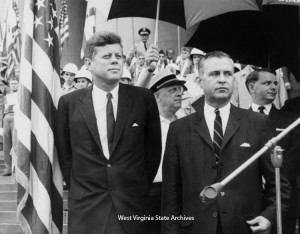Ed Rabel has been banned from appearing on or being mentioned on WCHS TV in Charleston, West Virginia.
Rabel is running as an independent for Congress in the state’s second Congressional District.
Rabel, the former CBS and NBC newsman, was banned by WCHS TV news director Matt Snyder.
Snyder didn’t like an op-ed article Rabel wrote last year for the Charleston Gazette.
Rabel’s article was titled “Local TV ‘News’ is a Waste of Your Time.”
The station management issued a directive that no story would be aired on the station about Rabel’s independent campaign for Congress.
“Not after what Rabel said in his Charleston Gazette op-ed,” Snyder said.
There were two incidents involving Rabel over the last year.
The first incident was in November 2013.
WCHS was preparing a story on the 50th anniversary of the assassination of President John F. Kennedy.
A WCHS news reporter wanted to interview Rabel for the story because in 1963 Rabel was the news director at WCHS and covered Kennedy’s June 20, 1963 visit to Charleston, West Virginia on the 100th anniversary of the founding of the state of West Virginia.
On June 20, 1963, Rabel was reporting live from the state capitol grounds on Kennedy’s visit.
After expressing his desire to interview Rabel about the events of the day, the news reporter was told that because of what Rabel wrote in March 2013 in the Charleston Gazette, Rabel would not be appearing on any of the station’s news programs and prohibited the reporter from interviewing Rabel.
The second incident occurred just last month when the same reporter was working on a story about Rabel launching his campaign on July 25, 2014 on Kayford Mountain, where Rabel denounced the coal industry’s practice of mountaintop removal mining.
The reporter was again told not to mention, under any circumstances, the launching of Rabel’s campaign.
The news director said that station was not to make any mention of Rabel’s independent campaign for Congress.
In his Charleston Gazette op-ed, Rabel calls local news “a colossal waste of time.”
“Instead of focusing on original reporting, the local stations are focused on cosmetics,” Rabel wrote. “Not a country for old men and women, the local television ‘news’ landscape is populated by bubble-heads and glib, young, sometimes pretty know-nothings. The truth is, they wouldn’t know a news story if it slapped them in the face. When was the last time you saw an investigative piece about, let’s see, the Massey Mine disaster? Or, how about, God forbid, an exclusive story that penetrated the precincts where politicians hide their secrets from the public?”
“There are reasons you don’t get the news on local TV,” Rabel wrote. “Station owners and managers forbid their news departments from stepping on toes and ruffling feathers, out of fear that such stories might insult local advertisers or offend politicians on whose toes reporters might stomp. And investigative or original reporting is costly, meaning real reporters must be hired to do real reporting, a job that requires lots of time and money that the stations have no time for. Instead, I remember one Huntington TV station leading its newscast last December with the astonishing news that Christmas tree sales were on the rise. Hold the presses!”
“Someone once said that owning a local TV station is like having a license to steal. But the real license to broadcast calls for the people to be informed. People, isn’t it time to revoke the license?”

